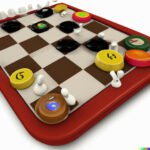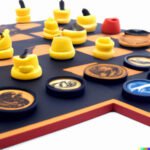Are you looking for a way to bring your family closer together and create lasting memories? Look no further than classic British family board games. These timeless treasures have been a staple of family game nights for generations, offering fun and entertainment for all ages. From the competitive thrills of Monopoly to the deductive challenges of Clue, these games have a special place in the hearts of many.
The history of classic British family board games is rich and fascinating, with origins that can be traced back through the decades. Games like Monopoly, Clue, and Scrabble have evolved over time, adapting to changing trends while maintaining their core appeal. Their enduring popularity is a testament to their cultural significance and the nostalgia they evoke in those who grew up playing them.
In this article, we will take a closer look at the top 5 classic British family board games that have stood the test of time. We will also explore how these beloved games have become ingrained in British family traditions and why they continue to hold a special place in our hearts.
Additionally, we will discuss some practical tips for hosting a memorable and enjoyable game night at home, as well as the educational benefits that these games can provide for children. So grab your favorite game and get ready to rediscover the joy of classic British family board games.
History of Classic British Family Board Games
Classic British family board games have a rich history that dates back many years. These beloved games, such as Monopoly, Clue, and Scrabble, have been enjoyed by generations of families and continue to be popular today. Tracing the origins and evolution of these classic games provides insight into their enduring appeal and cultural significance.
Origins of Monopoly
Monopoly, one of the most iconic classic British family board games, has a fascinating origin story. The game was originally created in the early 20th century by Lizzie Magie, an American woman who wanted to use it as a teaching tool to illustrate the pitfalls of wealth inequality. The game evolved over time and was eventually trademarked and sold to Parker Brothers in 1935. Since then, it has become a staple in households around the world.
The Evolution of Clue
Clue, known as Cluedo in the UK, also has an interesting history. It was invented during World War II by Anthony E. Pratt, a factory worker from Birmingham. Pratt patented the game in 1947, and it quickly gained popularity for its intriguing murder mystery premise and deduction-based gameplay. Over the years, Clue has seen various editions and spin-offs but remains cherished by families for its timeless appeal.
The Legacy of Scrabble
Scrabble is another classic British family board game with a storied past. It was first developed by Alfred Mosher Butts in the late 1930s but didn’t gain widespread recognition until it was published by James Brunot in 1948. Since then, Scrabble has become synonymous with wordplay and strategic thinking, captivating players of all ages with its simple yet engaging gameplay.
Understanding the origins and evolution of these classic British family board games allows us to appreciate their enduring legacy and impact on popular culture. These games have not only provided hours of entertainment for families but have also shaped how we approach strategy, deduction, and wordplay in our everyday lives.
Top 5 Classic British Family Board Games
Classic British family board games have been a staple in households for decades, providing hours of entertainment and bonding for generations. The top 5 classic British family board games listed below continue to captivate and engage players of all ages, standing the test of time with their timeless appeal.
- Monopoly: This iconic game of property and finance has been a favorite since it was first introduced in the early 20th century. Players buy, sell, and trade properties to build their real estate empire while trying to bankrupt their opponents.
- Clue (or Cluedo): This murder mystery game challenges players to solve a crime by deducing the culprit, the murder weapon, and the location of the crime. With its suspenseful gameplay and engaging storyline, Clue remains a beloved classic among families.
- Scrabble: A word game that tests players’ vocabulary and strategic skills, Scrabble has been entertaining families since its debut in the late 1940s. Players use letter tiles to form words on a game board, earning points based on word length and letter value.
- Trivial Pursuit: This trivia-based game covers a wide range of knowledge categories, making it enjoyable for players with diverse interests. Trivial Pursuit has become a household favorite, challenging players to demonstrate their general knowledge through question-and-answer gameplay.
- Risk: Known for its strategic gameplay and global conquest theme, Risk is a classic game that has remained popular since its inception. Players engage in diplomacy, alliances, and military tactics as they seek to dominate the world map.
These classic British family board games continue to hold a special place in the hearts of many due to their timeless gameplay mechanics and enduring popularity across generations. Whether it’s buying up properties in Monopoly or solving mysteries in Clue, these games provide endless fun while fostering social interaction and friendly competition among family members. With their rich history and cultural significance, these classics are sure to be enjoyed by many more families for years to come.
The Cultural Significance of Classic British Family Board Games
Classic British family board games have played a significant role in the cultural fabric of many families across the United Kingdom. Games like Monopoly, Clue, and Scrabble have not only provided hours of entertainment but have also become symbolic of togetherness and bonding.
These games are often passed down through generations, creating a sense of nostalgia and tradition within families. The familiar sight of a game board and the anticipation of rolling the dice evoke warm memories for many individuals, making classic British family board games an integral part of their childhood experiences.
One aspect of the cultural significance of these games is their ability to bring people together. Whether it’s a rainy afternoon or a holiday gathering, classic British family board games have been a unifying force for families, providing an opportunity for quality time spent in each other’s company. This shared experience fosters connections between family members and creates lasting memories that contribute to a sense of belonging and unity.
Moreover, classic British family board games have become embedded in popular culture, influencing literature, film, and even language. References to these iconic games are often made in works of fiction and media as they hold a special place in the hearts of many.
For example, the concept of “winning at all costs” from Monopoly or the suspenseful mystery-solving element from Clue has inspired various narratives beyond just gameplay. As such, these games continue to resonate with people on multiple levels, further cementing their cultural significance.
| Classic British Family Board Game | Cultural Significance |
|---|---|
| Monopoly | Symbolic of togetherness and bonding within families; unifying force bringing people together |
| Clue | Fosters connections between family members; embedded in popular culture influencing literature, film, and language |
| Scrabble | Creates lasting memories; holds a special place in the hearts of many |
Tips for Hosting a Classic British Family Board Game Night
Hosting a classic British family board game night can be a fun and entertaining way to spend quality time with loved ones. Whether you’re planning a regular game night or a special occasion, creating the perfect atmosphere is key to ensuring everyone has a great time. Here are some practical tips for hosting a successful game night at home.
First and foremost, setting the right mood is essential for a classic British family board game night. Creating a cozy and inviting space with ample seating, good lighting, and perhaps some background music can help set the stage for an enjoyable evening of gaming. Additionally, consider providing some snacks and beverages to keep everyone fueled and in high spirits throughout the games.
When choosing which classic British family board games to include in your game night lineup, it’s important to consider the preferences of your guests. Selecting a variety of games that cater to different interests and skill levels can ensure that there’s something for everyone to enjoy. From strategic games like Clue and Scrabble to more lighthearted options like Monopoly, having a diverse selection will keep the evening engaging.
Finally, establishing some ground rules and etiquette for the game night can help ensure that things run smoothly. Setting clear guidelines for taking turns, resolving disputes, and maintaining good sportsmanship can contribute to an overall positive experience for all participants.
| Tips for Hosting | Practical Advice |
|---|---|
| Create an inviting space with comfortable seating | Consider providing snacks and beverages |
| Select a variety of games | Establish ground rules and etiquette for the game night |
The Educational Benefits of Classic British Family Board Games
Classic British family board games are not only a source of entertainment and nostalgia but also provide immense educational benefits for children. These classic games, such as Monopoly, Scrabble, and Clue, offer a unique opportunity for children to develop critical thinking, strategy, and math skills while having fun with family and friends.
Critical Thinking
One of the key educational benefits of classic British family board games is the development of critical thinking skills. Games like Clue require players to use deduction and logical reasoning to solve the mystery, while Scrabble challenges players to strategize and think critically about word formation and placement. Through these games, children can enhance their problem-solving abilities and learn to analyze different scenarios.
Strategy
Furthermore, classic British family board games also help children develop strategic thinking. Games like Monopoly involve making decisions about investing in properties, managing finances, and negotiating with other players. This can help children understand the importance of planning ahead, weighing their options, and adapting their strategies based on the actions of their opponents.
Math Skills
In addition to critical thinking and strategy, these classic games also offer opportunities for children to practice important math skills. Whether it’s calculating scores in Scrabble, counting money in Monopoly, or strategizing moves based on probability in Clue, these games provide a practical context for applying mathematical concepts. As a result, children can improve their numeracy skills in a fun and engaging way.
Overall, classic British family board games offer more than just entertainment-they are valuable tools for promoting cognitive development in children. By honing their critical thinking, strategy, and math skills through gameplay, children can acquire essential abilities that will serve them well throughout their lives.
Modern Twists on Classic British Family Board Games
When it comes to classic British family board games, many iconic games have been given modern twists to appeal to a contemporary audience. These updates can breathe new life into old favorites, introducing them to a new generation of players while still retaining the charm and nostalgia of the original versions. Here are some examples of classic British family board games that have undergone modern transformations:
- Monopoly: The timeless game of buying, selling, and trading properties has evolved over the years with special edition versions based on popular TV shows, movies, and even video games. These modern iterations add a fresh spin to the classic game by incorporating new themes and elements that resonate with today’s audiences.
- Clue: This murder mystery game has been revamped with updated character designs, storylines, and even new ways to uncover clues. With different settings and scenarios, modern versions of Clue cater to diverse interests and keep the game exciting for both old fans and newcomers.
- Scrabble: The traditional word-building game has adapted to the digital age with app versions that allow players to compete against friends or strangers online. Players can also enjoy themed editions featuring specialized vocabularies or unique gameplay mechanics.
These modern twists on classic British family board games demonstrate how beloved titles can remain relevant in today’s fast-paced world. By embracing new concepts and technologies, these games continue to captivate players while preserving their legacy as staple entertainment for families across generations.
Conclusion
In today’s fast-paced, technology-driven world, classic British family board games continue to hold a special place in the hearts of many. Despite the proliferation of digital entertainment options, these timeless games have managed to maintain their enduring popularity and value. From the nostalgia they evoke to the educational benefits they offer, there are many reasons why classic British family board games remain relevant in today’s digital age.
One of the key reasons for the enduring popularity of classic British family board games is their ability to bring people together. In an age where digital devices often dominate our attention, these games provide a much-needed opportunity for face-to-face interaction and quality time with loved ones. Whether it’s a heated game of Monopoly or a friendly round of Scrabble, these games have a way of fostering bonding and creating lasting memories for families.
Furthermore, classic British family board games offer a break from the constant stimulation of screens and can provide a welcome respite from the pressures of daily life. The simplicity of rolling dice, moving tokens, and strategizing gameplay offers a refreshing change of pace from the complexities of digital entertainment.
Additionally, these games can be enjoyed by people of all ages, making them an inclusive and accessible form of entertainment for families to enjoy together. As we look to the future, it’s clear that classic British family board games will continue to play an important role in bringing joy, laughter, and cherished moments to households across the globe.
Frequently Asked Questions
What Is a Popular Board Game in England?
A popular board game in England is Monopoly. The game has been a favorite for decades and is widely enjoyed by people of all ages. Its iconic London-based version adds to its popularity in England.
What Board Games Originated in England?
Two board games that originated in England are Snakes and Ladders, which was based on an ancient Indian game, and Cluedo (or Clue), which was created by Anthony E. Pratt in 1949. Both games have become classic choices for many.
What Are the Most Played Classic Board Games?
Some of the most played classic board games include Chess, Checkers (also known as Draughts), and Backgammon. These games have stood the test of time and continue to be enjoyed by people all over the world for their strategic and competitive elements.

I love playing all kinds of games – from classics like Monopoly to modern favourites like Ticket to Ride.
I created this blog as a way to share my love of board games with others, and provide information on the latest releases and news in the industry.





